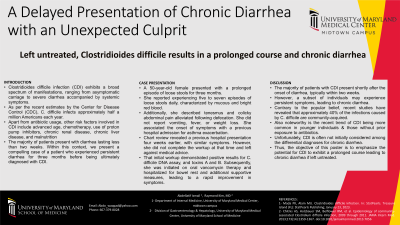Monday Poster Session
Category: Colon
P1665 - A Delayed Presentation of Chronic Diarrhea With Unexpected Culprit
Monday, October 23, 2023
10:30 AM - 4:15 PM PT
Location: Exhibit Hall

Has Audio

Abdellatif Ismail, MBBS, MD
University of Maryland Medical Center Midtown Campus
Baltimore, MD
Presenting Author(s)
Abdellatif Ismail, MBBS, MD1, Raymond Kim, MD, DM2
1University of Maryland Medical Center Midtown Campus, Baltimore, MD; 2University of Maryland Medical Center, Baltimore, MD
Introduction: Clostridioides difficile infection (CDI) exhibits a broad spectrum of manifestations, ranging from asymptomatic carriage to severe diarrhea. While most patients present with diarrhea lasting less than two weeks, there are exceptions. Within this context, we present a compelling case of persistent diarrhea that was ultimately diagnosed as CDI.
Case Description/Methods: A 50-year-old female with a history of asthma presented with history of loose stools for three months. She reported experiencing 5 to 7 episodes of loose stools daily, primarily postprandial, characterized by mucous and red blood. Additionally, she described tenesmus and colicky abdominal pain, which was relieved with defecation. Notably, the patient did not report vomiting, fever, or any weight changes. She associated the onset of symptoms with a previous hospital admission for asthma exacerbation. On physical examination, she appeared unwell, with dry mucous membranes, while vital signs fell within normal limits. Abdominal examination revealed tenderness in the left lower quadrant.
Chart review revealed a previous hospital presentation four weeks earlier, with similar symptoms. However, she did not complete the workup at that time and left against medical advice. Workup upon that encounter demonstrated positive results for C. difficile DNA assay, toxins A and B, and elevated calprotectin levels. Consequently, she was initiated on oral vancomycin therapy and admitted to the hospital for bowel rest, leading to a rapid improvement in symptoms.
Discussion: Clostridioides difficile colonizes the gastrointestinal tract as a result of disruption of its normal flora. While the majority of patients present shortly after symptom onset, typically within two weeks, a subset of individuals may experience persistent symptoms, leading to chronic diarrhea. Unfortunately, CDI is often not initially considered among the differential diagnoses for chronic diarrhea. Thus, the objective of this abstract is to emphasize the potential for CDI to exhibit a prolonged course if left untreated.
Thorough history-taking, with particular emphasis on exposure to antibiotics, proton pump inhibitors, and other risk factors such as enteral feeding, inflammatory bowel disease, and cirrhosis plays a crucial role in achieving an accurate diagnosis. It is important to note the emerging trend of community-acquired CDI, suggesting that testing for CDI should be considered within the appropriate clinical context, even in the absence of classic risk factors.
Disclosures:
Abdellatif Ismail, MBBS, MD1, Raymond Kim, MD, DM2. P1665 - A Delayed Presentation of Chronic Diarrhea With Unexpected Culprit, ACG 2023 Annual Scientific Meeting Abstracts. Vancouver, BC, Canada: American College of Gastroenterology.
1University of Maryland Medical Center Midtown Campus, Baltimore, MD; 2University of Maryland Medical Center, Baltimore, MD
Introduction: Clostridioides difficile infection (CDI) exhibits a broad spectrum of manifestations, ranging from asymptomatic carriage to severe diarrhea. While most patients present with diarrhea lasting less than two weeks, there are exceptions. Within this context, we present a compelling case of persistent diarrhea that was ultimately diagnosed as CDI.
Case Description/Methods: A 50-year-old female with a history of asthma presented with history of loose stools for three months. She reported experiencing 5 to 7 episodes of loose stools daily, primarily postprandial, characterized by mucous and red blood. Additionally, she described tenesmus and colicky abdominal pain, which was relieved with defecation. Notably, the patient did not report vomiting, fever, or any weight changes. She associated the onset of symptoms with a previous hospital admission for asthma exacerbation. On physical examination, she appeared unwell, with dry mucous membranes, while vital signs fell within normal limits. Abdominal examination revealed tenderness in the left lower quadrant.
Chart review revealed a previous hospital presentation four weeks earlier, with similar symptoms. However, she did not complete the workup at that time and left against medical advice. Workup upon that encounter demonstrated positive results for C. difficile DNA assay, toxins A and B, and elevated calprotectin levels. Consequently, she was initiated on oral vancomycin therapy and admitted to the hospital for bowel rest, leading to a rapid improvement in symptoms.
Discussion: Clostridioides difficile colonizes the gastrointestinal tract as a result of disruption of its normal flora. While the majority of patients present shortly after symptom onset, typically within two weeks, a subset of individuals may experience persistent symptoms, leading to chronic diarrhea. Unfortunately, CDI is often not initially considered among the differential diagnoses for chronic diarrhea. Thus, the objective of this abstract is to emphasize the potential for CDI to exhibit a prolonged course if left untreated.
Thorough history-taking, with particular emphasis on exposure to antibiotics, proton pump inhibitors, and other risk factors such as enteral feeding, inflammatory bowel disease, and cirrhosis plays a crucial role in achieving an accurate diagnosis. It is important to note the emerging trend of community-acquired CDI, suggesting that testing for CDI should be considered within the appropriate clinical context, even in the absence of classic risk factors.
Disclosures:
Abdellatif Ismail indicated no relevant financial relationships.
Raymond Kim: Apollo Endosurgery – Consultant. Cook medical – Consultant.
Abdellatif Ismail, MBBS, MD1, Raymond Kim, MD, DM2. P1665 - A Delayed Presentation of Chronic Diarrhea With Unexpected Culprit, ACG 2023 Annual Scientific Meeting Abstracts. Vancouver, BC, Canada: American College of Gastroenterology.
